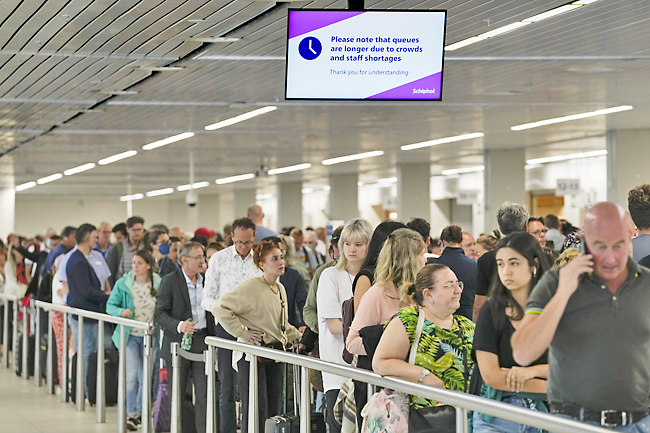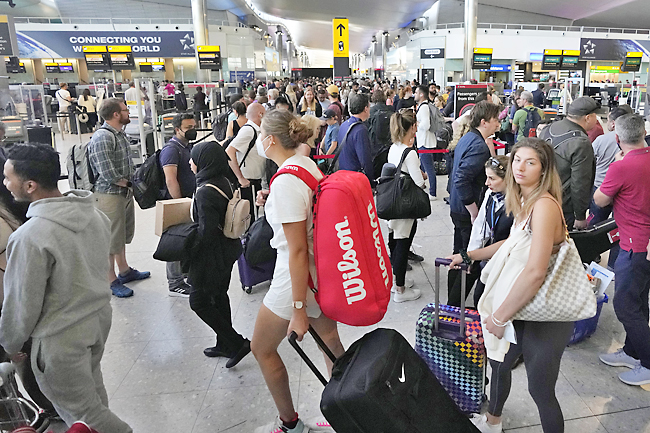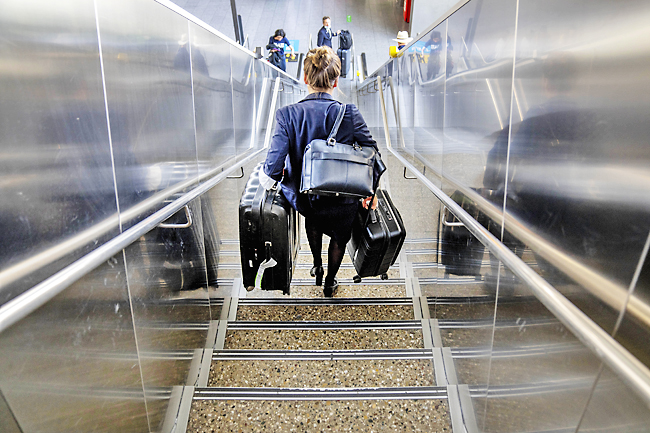Kelvin Chan & Mike Corder
LONDON (AP) – Got European travel plans this summer? Don’t forget to pack your passport, sunscreen and plenty of patience.
Liz Morgan arrived at Amsterdam’s Schiphol Airport four-and-a-half hours before her flight to Athens, finding the line for security snaking out of the terminal and into a big tent along a road before doubling back inside the main building.
“There’s elderly people in the queues, there’s kids, babies. No water, no nothing. No signage, no one helping, no toilets,” said Morgan, who is from Australia and had tried to save time on Monday by checking in online and taking only a carry-on bag.
“People couldn’t get to the toilet because if you go out of the queue, you lost your spot,” she said.
After two years of pandemic restrictions, travel demand has roared back, but airlines and airports that slashed jobs during the depths of the COVID-19 crisis are struggling to keep up.
With the busy summer tourism season underway in Europe, passengers are encountering chaotic scenes at airports, including lengthy delays, cancelled flights and headaches over lost luggage.
Schiphol, the Netherlands’ busiest airport, is trimming flights, saying there are thousands of airline seats per day above the capacity that security staff can handle. Dutch carrier KLM apologised for stranding passengers there this month.

PHOTOS: AP

London’s Gatwick and Heathrow airports are asking airlines to cap their flight numbers.
Discount carrier easyJet is scrapping thousands of summer flights to avoid last-minute cancellations and in response to caps at Gatwick and Schiphol. North American airlines wrote to Ireland’s transport chief demanding urgent action to tackle “significant delays” at Dublin’s airport.
Nearly 2,000 flights from major continental European airports were canceled one week this month, with Schiphol accounting for nearly nine per cent, according to data from aviation consultancy Cirium. A further 376 flights were cancelled from United Kingdom (UK) airports, with Heathrow accounting for 28 per cent, Cirium said.
It’s a similar story in the United States (US), where airlines canceled thousands of flights over two days last week because of bad weather just as crowds of summer tourists grow.
“In the vast majority of cases, people are travelling,” said CEO of the Advantage Travel Group Julia Lo Bue-Said, which represents about 350 UK travel agents. But airports are suffering from staff shortages, and it’s taking a lot longer to process security clearances for newly hired workers, she said.
“They’re all creating bottlenecks in the system,” and it also means “when things go wrong, that they’re going drastically wrong”, she said.
The Biden administration scrapping COVID-19 tests for people entering the US is giving an extra boost to pent-up demand for transatlantic travel. Bue-Said said travel agents her group represents reported a jump in US bookings after the requirement was dropped this month.
For American travellers to Europe, the dollar strengthening against the euro and the pound is also a factor, because it makes paying for hotels and restaurants more affordable.
At Heathrow, a sea of unclaimed luggage blanketed the floor of a terminal last week. The airport blamed technical glitches with the baggage system and asked airlines to cut 10 per cent of flights at two terminals on Monday, affecting about 5,000 passengers.
“A number of passengers” may have travelled without their luggage, the airport said.
When cookbook writer Marlena Spieler flew back to London from Stockholm this month, it took her three hours to get through passport control.
Spieler, 73, spent at least another hour and a half trying to find her luggage in the baggage area, which “was a madhouse, with piles of suitcases everywhere”. She almost gave up, before spotting her bag on a carousel. She’s got another trip planned to Greece in a few weeks but is apprehensive about going to the airport again.
“Frankly, I am frightened for my well-being. Am I strong enough to withstand this?” Spieler said by e-mail.
In Sweden, lines for security at Stockholm’s Arlanda Airport have been so long this summer that many passengers have been arriving more than five hours before boarding time. So many are showing up early that officials are turning away travellers arriving more than three hours before their flight to ease congestion.
Despite some improvements, the line to one of the checkpoints stretched more than 100 metres on Monday.
Four young German women, nervous about missing their flight to Hamburg while waiting to check their bags, asked other passengers if they could skip to the front of the line. Once there, they bought fast-track passes to avoid the long security queue.
Lina Wiele, 19, said she hadn’t seen quite the same level of chaos at other airports, “not like that, I guess”, before rushing to the fast-track lane.
Thousands of pilots, cabin crew, baggage handlers and other aviation industry workers were laid off during the pandemic, and now there’s not enough of them to cope with the travel rebound.
“Some airlines are struggling because I think they were hoping to recover staffing levels quicker than they’re able to do,” said Head of the International Air Transport Association Willie Walsh.
The post-pandemic staff shortage is not unique to the airline industry, Walsh said at the airline trade group’s annual meeting this week in Qatar.
“What makes it difficult for us is that many of the jobs cannot be operated remotely, so airlines have not been able to offer the same flexibility for their workforce as other companies,” he said. “Pilots have to be present to operate the aircraft, cabin crew have to be present, we have to have people loading bags and assisting passengers.”
Laid-off aviation workers “have found new jobs with higher wages, with more stable contracts”, said Joost van Doesburg of the FNV union, which represents most staff at Amsterdam’s Schiphol Airport. “And now everybody wants to travel again”, but workers don’t want airport jobs.
The CEO of budget airline Ryanair, Europe’s biggest carrier, warned that flight delays and cancellations would continue “right throughout the summer”. Passengers should expect a “less-than-satisfactory experience”, Michael O’Leary told Sky News.
Some European airports haven’t seen big problems yet but are bracing. Prague’s Vaclav Havel international airport expects passenger numbers to swell next week and into July, “when we might experience a lack of staffers, especially at the security checks”, spokeswoman Klara Diviskova said.
The airport is still short “dozens of staffers” despite launching a hiring campaign at the start of the year, she said.
Labour strife also is causing problems. In Belgium, Brussels Airlines said a three-day strike which started yesterday will force the cancellation of about 315 flights and affect some 40,000 passengers.
Two days of strikes hit Paris’ Charles de Gaulle airport this month, one by security staff and another by airport personnel who said salaries aren’t keeping pace with inflation. A quarter of flights were cancelled the second day. Some Air France pilots are threatening a strike tomorrow, warning that crew fatigue is threatening flight security, while airport personnel vow another salary-related strike on July 1.
Still, the airport problems are unlikely to put people off flying, said spokesman for Czech travel agency CK Fischer Jan Bezdek, which has sold more holiday packages so far this year than before the pandemic.
“What we can see is that people can’t stand waiting to travel after the pandemic,” Bezdek said. “Any problems at airports can hardly change that.”






